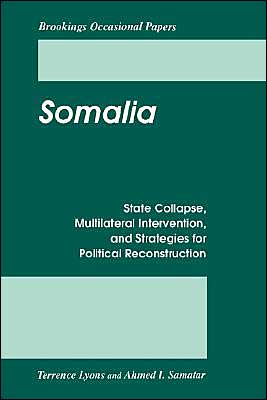

 |

|

The average rating for Somalia: State Collapse, Multilateral Intervention, and Strategies for Political Reconstruction based on 2 reviews is 4 stars.
Review # 1 was written on 2008-08-01 00:00:00 Malaika Dracu Malaika DracuThe first remarkable thing about Killing Neighbors is its meta-narrative: the author spent nearly two years in Rwanda researching this project by conducting interviews in a delicate political environment with the help of an interpreter who translated Fujii's questions from French to Kinyarwanda and back again. So the author's commitment to an extensive and exhaustive approach to the subject matter is clear from the outset. But perhaps most remarkable is how thoughtfully Fujii frames the prevailing explanations for the Rwandan genocide before deftly dispensing with them in favor of a more nuanced argument about why the violence was possible. Rather than settling on an "ethnic fear" or "ethnic hatred" thesis (which is common to genocide scholarship), Fujii mines her interview data for insight into a more chilling reality: that those tasked with hacking Tutsi men, women, and children to death did so, by and large, without any sort of conviction about Hutu superiority or fearsome machinations among Tutsi. Instead, most of the men Fujii describes as "Joiners" took part in the local-level violence because they felt they only had two choices: participate in the violence or become a target of it. Yet even after forming part of these killing groups, many Joiners spared the lives of Tutsi targets in exchange for money, out of regard for prior social ties to the potential victims, or simply due to lack of interest in taking someone's life in a given moment. What powers Fujii's argument is a really fascinating understanding of the meaning of ethnicity in Rwanda prior to the genocide. Fujii shows how fluid ethnic markers could be (Tutsi, for example, were known to like cows, making anyone in possession of a large collection of cows a likely Tutsi), and how loosely people could hold onto ethnic designations over the course of a lifetime (in one case, a Tutsi family "became" Hutu after suffering a loss of family property). By showing how ethnicity created (and did not create) meaning in the lives of Rwandans, Fujii is able to dispel the myth that deep ethnic cleavages gave rise to large-scale violence. I can't do the author's argument justice here, for all its sophistication and even-handedness, especially since so many people will get so much out of this book that they should read it themselves. Readers with a casual knowledge of the genocide will walk away with a more profound understanding of the parties involved -- one that offers even the most "grotesque" figures a measure of humanity. But I really hope her first chapter, which discusses her methodology, takes on a life of its own. It not only serves as a model for how researchers should interact with informants, but it's grounded in a refreshing honesty about how her own identity markers shape her interview subjects' responses to her and her questions. Too often, researchers confuse their hopes for the relationship they will have with their interview subjects with the reality of those relationships, and lose much credibility in the process. Here, Fujii's candor serves her argument beautifully. |
Review # 2 was written on 2011-07-02 00:00:00 Michael Allison Michael AllisonIn her book "Killing Neighbors: Webs of Violence in Rwanda," Lee Ann Fujii gives readers a historical background leading up to the genocide in Rwanda and attempts to explain how ordinary human beings can turn on their neighbors and become genocidaires. While many scholars have explained that the actions of these genocidaires stem from ethnic hatred and ethnic fear, Fujii argues that social interaction played a much larger role in explaining their participation in genocidal actions. I found Fujii's book very interesting and find her arguments compelling. Fujii believes that the local ties and the dynamics of the group bound the perpetrators together and served as a way to recruit others and initiate others into killing those they considered their enemies. Once initiated, they continued to kill because their participation conferred on them a powerful identity as a member of the group. Fujii also believes that situation factors and personal motives (greed and jealousy) played a key role in explaining their participation in mass murder. This was a very interesting read. I recommend her book. |
CAN'T FIND WHAT YOU'RE LOOKING FOR? CLICK HERE!!!